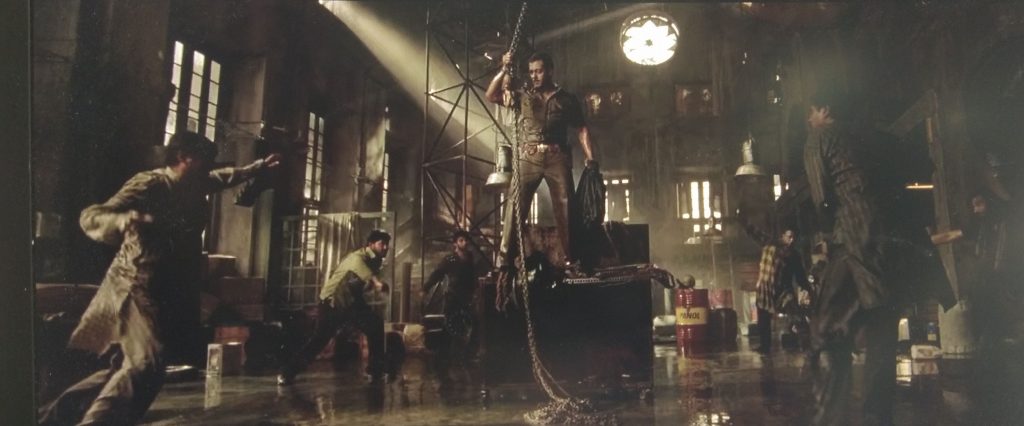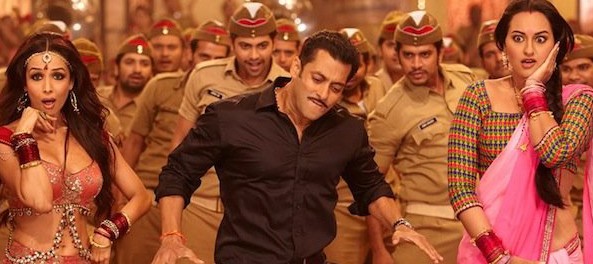Author: Nandini Bhattacharya is a Professor of English at Texas A&M University and the founder and director of the South Asia Working Group of the Humanities Center at Texas A&M University. She has taught and published on film, feminism and visual culture, colonial and postcolonial discourse analyses of Literature from the eighteenth century onwards, gender in South Asia, world literature, and travel writing. Her first novel, Love’s Garden, will be released on 27th October 2020.
Exit Sholay. Enter Dabangg. Farewell, Mother India.
The State has definitely failed. As part of the state machinery, the police in India don’t behave that differently from the criminal and political bodies they are meant to snuff out. But Indian cinema — bless its heart — has tried to be more optimistic. The police were treated sympathetically in the film Mumbai Meri Jaan (2008) as of the people and their saviors. In the film Dabangg (2010) the policeman played by Bollywood ‘bad boy’ Salman Khan, who ran over pavement squatters one night in a bad mood (one supposes), achieves iconicity well beyond reclamation from the primeval slime of primordial male violence. That’s why in Dabangg goons literally crash and shatter when the Khan ‘encounters’ them.

This is not the old dishoom-dishoom of Hindi films, folks, where the baddy gets at least a chance at counter-blows with the heir-elect hero before being decisively and sometimes laughably overpowered. This is just one grand DISHOOM heard across India. The baddies in Dabangg, like goon clusters in Hong Kong action cinema, resemble mere ‘things’ when they shatter and fly off the wheel of Salman Khan’s disciplinary fist (and arms and legs and torso and feet) of fury.
In Dabangg it’s the police who are the salt of the earth, the sons of the soil, the avengers. Is this implausible? Yes. So the question is this: why does Dabangg invest so much (casting Khan must have hurt the budget like hell) in the re-humanization of the police?
In Dabangg it’s the police who are the salt of the earth, the sons of the soil, the avengers. Is this implausible? Yes. So the question is this: why does Dabangg invest so much (casting Khan must have hurt the budget like hell) in the re-humanization of the police?
The film’s title Dabangg (note the bouncing reverberation, the repetition of the ‘g’ at the end, which is a gratuitous emphasis lacking in the actual Hindi world ‘dabang’) means, strong, audacious or powerful. I also translate it as meaning ‘momentous,’ for three reasons I’ll come to in a minute. It depicts, of course, only a variation on the theme of rough justice by the lone ranger-cum-outlaw-cum-self-appointed-vigilante that runs long and bountiful in Hindi cinema. In the 1930s the swashbuckling Fearless Nadia (nee Mary Jone Evans) whipped, wrestled and indeed crushed villainy out of the bodies of baddies. Wrestler-hero Dara Singh in sixties and seventies B-grade films followed the hint. And then came the greatest avenger of all: a towering Angry Young Man aka Amitabh Bachchan. But none of these avengers ever had any time of day for the Indian police force.
And then there was Dabangg, the fourth largest box-office grosser of Indian film history. And its hero, its savior of Mother India, was a policeman. Two years later though, on the night of December 16th, 2012, six men raped and killed a young woman on a DTC bus in New Delhi. Amidst nation-wide horror and outrage, Salman Khan’s volleys against gender violence rang loud and long. It was, to return to my invocation of the word ‘momentum,’ quite momentous.
I promised I would return to ‘momentous,’ and so we do. As we know, the definition of momentum in Physics is mass multiplied by velocity. We also know that momentum is Dabangg’s aesthetic imprimatur for the rape and revenge cycle for which Indian films are also famous. But what kind of momentous violence? Who hits? And who falls?
Three kinds of bodies do or can fall in Dabangg: male baddies, good ladies, and dancing ladies. Villainous male bodies, especially of criminals and politicians, fall and shatter. The only time our alpha policeman Chulbul Pandey (aka Salman Khan) falls, he resurrects his power by his contact with Mother Earth (think the Greek hero Hercules, son of the Goddess Earth). The good lady Mrs. Chulbul Pandey played by Sonakshi Sinha, daughter of the legendary avenger ‘Kalicharan’ or Shatrughan Sinha (and Mother Earth and possibly Mother India in the making) falls too. But she falls literally, physically. Mrs. Chulbul Pandey is a ‘fallen woman’ because she literally, physically falls and miscarries her baby. When she falls, she falls as a mother might, but not as a street dancer does. She is picked up, comforted, loved, and presumably re-impregnated.

But Munni the dancing lady of Dabangg — played by the foxy also-ran Malaika Arora — who fell long ago shattered with her fall, and has become a brothel favorite and product placement chanteuse for the popular pain-reliever Zandu balm that she rubs on her hips for unmentionable aches and breaks while unambiguously gleefully gyrating the same hips. How can she not? She’s glamorous like Shilpa Shetty and Bebo or Kareena Kapoor — she sings — two Hindi film heroines known for both looks and oomph. The assembled hoi polloi in the brothel courtyard go wild.
The baddies will lie in a cluttered heap in one corner. But who will raise Munni fallen in her corner, whether or not she fell on a moving bus somewhere, some cold night? And give her another chance? Not Mr. Chulbul Pandey, nor Mr. Salman Khan. He will save his momentum for exploits of greater glory.
And so you have it. The eternal rectangle (my own term). In one corner Mother India has fallen and even miscarried. But she will rise — be raised again by protector Chulbul Pandey, legendary policeman of the Hindi heartland — and presumably have more sons who will be like him. Chulbul Pandey will stand strong on their shoulders. The baddies will lie in a cluttered heap in one corner. But who will raise Munni fallen in her corner, whether or not she fell on a moving bus somewhere, some cold night? And give her another chance? Not Mr. Chulbul Pandey, nor Mr. Salman Khan. He will save his momentum for exploits of greater glory.
Leave a Reply